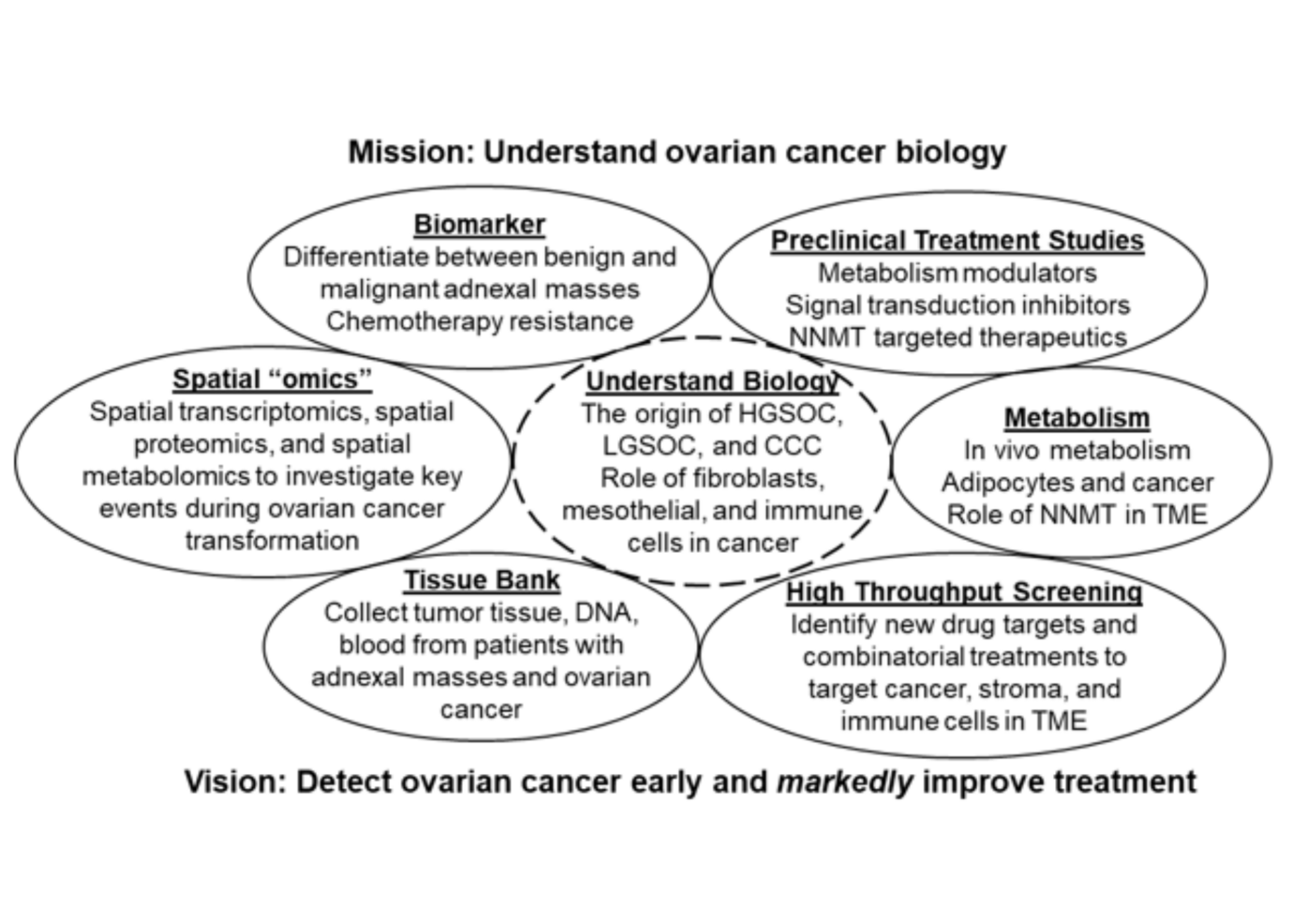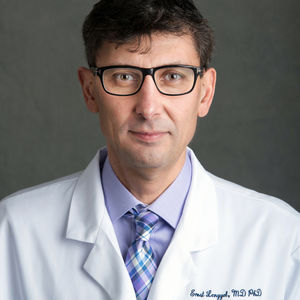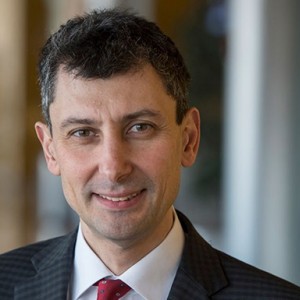Research Summary:
The Ovarian Cancer Laboratory at the University of Chicago, founded in 2004, is dedicated to improving our understanding of the biology of ovarian cancers, including high-grade serous, low-grade serous and clear cell carcinoma to identify new therapeutic options for patients. We have a collaborative environment in the laboratory, where scientists, postdocs, physicians, fellows and students work together to answer critical questions in ovarian cancer biology. We meet once a week to discuss research results and new ideas or listen to an invited speaker in our field. The laboratory is directed by Ernst Lengyel, MD, PhD, a clinically active gynecologic oncologist with a special focus on the surgical treatment of ovarian cancer, and Hilary Kenny, PhD, a Research Associate Professor whose work focuses on elucidating the role of the tumor microenvironment in ovarian cancer development and metastasis. Drs. Lengyel and Kenny have worked together successfully since 2005.
Ovarian cancer is the sixth leading cause of cancer death among women in the United States. The high fatality of the disease is because it is often diagnosed at a late stage when tumor cells have disseminated within the peritoneal cavity. Unfortunately, despite aggressive treatment, most patients have an incurable recurrence at some point in their cancer journey. For clinical information about ovarian cancer and ovarian mass treatments, please visit the University of Chicago Medicine’s Gynecologic Oncology webpage. View publications for Dr. Ernst Lengyel and Dr. Hilary Kenny.
Main projects in the laboratory:

Our research is bedside to bench using primary human and cultured cells of the normal microenvironment (epithelial, fibroblasts, mesothelial cells, adipocytes, and immune cells) and tumor microenvironment (cancer and cancer-associated stromal cells), parallel to mouse models of ovarian cancer (xenograft, syngeneic, and genetic). Interactions between cancer cells and the microenvironment are investigated in vitro using novel organotypic 3D cultures. We have also assembled tissue micro arrays (TMA) of primary and metastatic ovarian cancers. These tissue samples are linked to a database containing clinico-pathologic information on all ovarian cancer patients operated on at the University of Chicago since 1992.
Collaborations:
To reach our goals, we have formed important collaborations with physicians and scientists. The common goal of everybody working in or with our laboratory is to transfer knowledge from the laboratory to the clinical arena, so we may improve the survival of women suffering from ovarian cancer. Our collaborators include:
- The Mann Laboratory (Proteomics and Spatial Proteomics)
- National Center for Advancing Translational Science (NCATS) (High throughput screening, NExT Program)
- The Faubert Laboratory: Dr. Brandon Faubert (Metabolomics)
- The Moellering Laboratory: Dr. Raymond Moellering (Metabolomics)
- The He Laboratory: Dr. Cheung He (Methylation)
- Dr. Ricardo R. Lastra (Gynecologic Pathology)
- Dr. Yan Li (Bioinformatics)
- Dr. Diane Yamada, Dr. Katie Kurnit, and Dr. Sarah Ackroyd (Gynecologic Oncology)
- The Naora Laboratory (Neutrophils and Aging)
- The Weichselbaum Laboratory (Targeting NNMT)
- The Drapkin Laboratory (Clear cell carcinoma)
- The Kelley Laboratory (cTRL Therapeutics)
- Hardik Shah (Spatial Metabolomics and Metabolomics)
- The Zhang Laboratory (Clear cell carcinoma)
Join the Ovarian Cancer Laboratory:
We have job openings for research assistants and postdoctoral scientists. Email us your CV if you're interested in joining our team: lengyeloffice@bsd.uchicago.edu.
Post-doctoral Scholar Positions in Spatial ‘Omics’ and Ovarian Cancer Biology
The Ovarian Cancer Research Laboratory led by Drs. Lengyel and Kenny is seeking highly motivated postdocs to join our laboratory’s efforts to understand human ovarian cancer biology. Our laboratory studies the role of the microenvironment in ovarian cancer development and progression; using knowledge gained to develop novel treatments for metastatic ovarian cancer. The postdoc will have the opportunity to work in a multi-disciplinary environment in close collaboration with physicians, device fabrication engineers, statisticians, and molecular and systems biologists at the University of Chicago.
The postdoc will map all cell types in the female reproductive system and ovarian cancer tumors with a focus on site-specific cell-cell interactions, their response to environmental cues, and their role in ovarian cancer pathogenesis and progression. We aim to evaluate the function of different cell types using state-of-the-art, high-throughput ‘omics’ techniques.
Job Requirements:
- PhD, MD, or equivalent doctoral degree in systems biology, molecular biology, cancer biology, biochemistry, chemical or biomedical engineering
- Record of scientific achievement through publications and presentations
- Strong track record in design and execution of experiments and a passion for translational science
- Excellent written and spoken communication skills in English
- Ability to conduct research independently; interest in mechanistic research
- Superb problem-solving skills
- Exceptional interpersonal skills
- Impeccable wet lab skills
- Experience with flow cytometry, optical microscopy, immunohistochemistry, immunofluorescence, molecular biology, and sequencing are strongly desired
- Familiarity with spatial proteomics and bioinformatics will be advantageous
Please email Ernst Lengyel at lengyeloffice@bsd.uchicago.edu with a brief statement regarding research interests, CV, and a list of two references with their email addresses.
Apply online for these open positions:
Funding:
|
2021-2028 |
R35 Outstanding Investigator Award
|
|
2006 – 2026 |
Bears Care (NFL Chicago Bears)
|
|
2025 – 2028 |
|
|
2023 – 2025 |
Janet Burros Ovarian Cancer Initiative
|
| 2025-2027 |
STAAR Low-Grade Serous Ovarian Cancer Foundation
|
| 2025-2030 | RO1 NCI
|

Ernst Lengyel, MD, PhD
Arthur L. and Lee G. Herbst Professor of Obstetrics and Gynecology, Chair of the Department of Obstetrics and Gynecology






